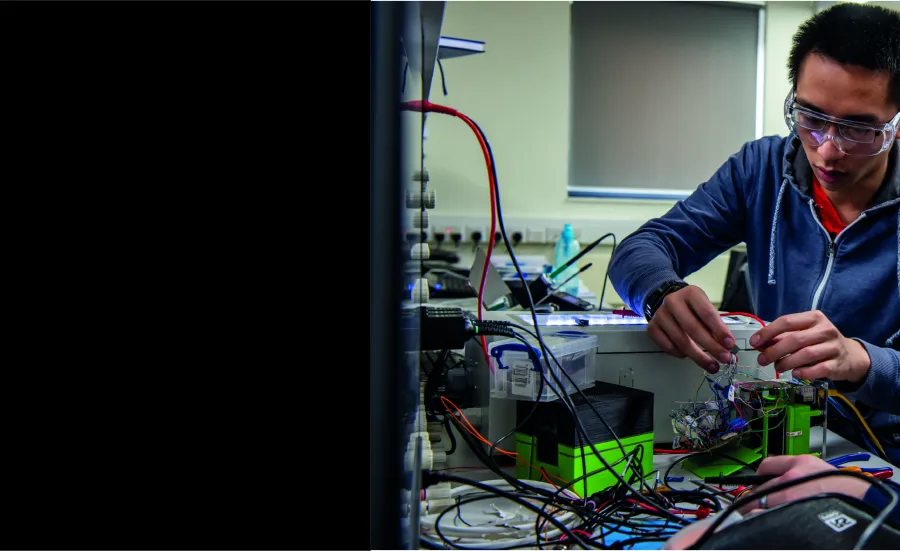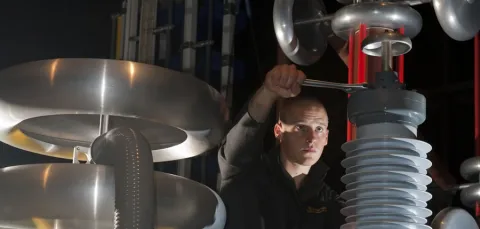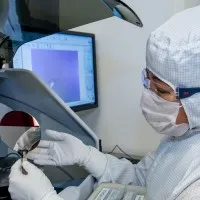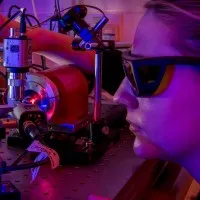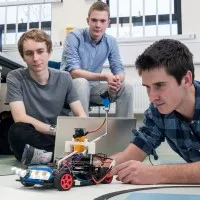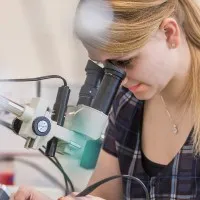About this course
Our electrical and electronic engineering courses offer a breadth and depth of study that you’ll find at few other UK universities. This master's in electrical and electronic engineering builds on the BEng programme. The programme gives you the opportunity to learn the management skills needed to become a leader in this industry and to explore additional specialist modules.
Electrical engineering is about the generation, distribution and use of electricity on a large scale, while electronics is all about the components and systems that make electronic devices work. On this electrical and electronic engineering degree you’ll gain a thorough grounding in both disciplines, and learn how they interrelate.
You’ll learn from researchers who will share their passion for their areas of expertise, which include high-voltage electrical engineering, sustainable energy and machine learning. Examples of practical design work on this course include designing and testing a microprocessor, a robot, or a large integrated circuit.
You can choose to study topics to suit your career path, including:
- green electronics
- medical technologies
- nanoelectronics
- quantum devices
You’ll learn to use industry-standard software for tasks such as the simulation of power line systems. For some students, a design project can lead to the publication of their first scientific paper. You’ll also gain direct industry experience through work placements.
This MEng Electrical and Electronic Engineering degree is accredited by the Institution of Engineering and Technology on behalf of the Engineering Council for the purposes of fully meeting the academic requirement for registration as a Chartered Engineer.
Year in industry
Enhance your employability by taking this course with a paid industrial studies placement year.
Apply using:
- Course name: Electrical and Electronic Engineering with Industrial Studies
- UCAS code: HH60
You'll spend this extra year at one of our partner companies, applying the skills and knowledge you've learned so far.
The fee is 20% of the standard annual tuition fee.
Study this course in Malaysia
You can also study this course at University of Southampton Malaysia.
Find out more about our Malaysia courses and how to apply
We regularly review our courses to ensure and improve quality. This course may be revised as a result of this. Any revision will be balanced against the requirement that the student should receive the educational service expected. Find out why, when, and how we might make changes.
Our courses are regulated in England by the Office for Students (OfS).
An introduction to Electrical and Electronic Engineering
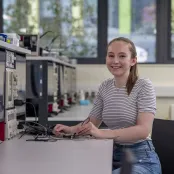
The Electronics and Computer Science facilities are phenomenal – no other university provides the same standard and quantity of equipment. Extra facilities for third and fourth year students ensure access to equipment.

It’s been a fantastic experience and a unique opportunity to be involved with a student engineering project alongside my degree.”
Course location
This course is based at Highfield.
Awarding body
This qualification is awarded by the University of Southampton.
Download the Course Description Document
The Course Description Document details your course overview, your course structure and how your course is taught and assessed.
Entry requirements
For Academic year 202627
A-levels
A*AA including mathematics (minimum grade A) and either physics, further mathematics, electronics or computer science (minimum grade A)
A-levels additional information
Offers typically exclude General Studies and Critical Thinking.
Applicants who have not studied the required subjects can apply for the Engineering/Physics/Mathematics Foundation Year
A-levels with Extended Project Qualification
If you are taking an EPQ in addition to 3 A levels, you will receive the following offer in addition to the standard A level offer: AAA including mathematics and either physics, further mathematics, electronics or computer science, plus grade A in the EPQ
A-levels contextual offer
We are committed to ensuring that all learners with the potential to succeed, regardless of their background, are encouraged to apply to study with us. The additional information gained through contextual data allows us to recognise a learner’s potential to succeed in the context of their background and experience. Applicants who are highlighted in this way will be made an offer which is lower than the typical offer for that programme as follows:
AAB including mathematics (minimum grade A) and either physics, electronics, further mathematics or computer science (minimum grade A)
International Baccalaureate Diploma
Pass, with 38 points overall with 19 points required at Higher Level including 6 at Higher Level in Mathematics (Analysis and Approaches) or 7 at Higher Level in Mathematics (Applications and Interpretation), and 6 at Higher Level in either Physics or Computer Science.
International Baccalaureate Diploma additional information
Applicants who have not studied the required subjects at Higher Level can apply for the Engineering/Physics/Mathematics Foundation Year
International Baccalaureate contextual offer
We are committed to ensuring that all learners with the potential to succeed, regardless of their background, are encouraged to apply to study with us. The additional information gained through contextual data allows us to recognise a learner’s potential to succeed in the context of their background and experience. Applicants who are highlighted in this way will be made an offer which is lower than the typical offer for that programme.
International Baccalaureate Career Programme (IBCP) statement
Offers will be made on the individual Diploma Course subject(s) and the career-related study qualification. The CP core will not form part of the offer. Where there is a subject pre-requisite(s), applicants will be required to study the subject(s) at Higher Level in the Diploma course subject and/or take a specified unit in the career-related study qualification. Applicants may also be asked to achieve a specific grade in those elements. Please see the University of Southampton International Baccalaureate Career-Related Programme (IBCP) Statement for further information. Applicants are advised to contact their Faculty Admissions Office for more information.
BTEC
RQF BTEC
D in the BTEC National Extended Certificate plus grades A*A from two A-levels including mathematics and either physics, further mathematics, electronics or computer science.
or
D* in the BTEC National Extended Certificate plus grades AA from two A-levels including mathematics and either physics, further mathematics, electronics or computer science.
We will consider the BTEC National Extended Diploma in Engineering if studied alongside A-level mathematics.
We will consider the BTEC National Diploma if studied alongside A-levels in mathematics and either physics, further mathematics, electronics or computer science.
We are committed to ensuring that all learners with the potential to succeed, regardless of their background, are encouraged to apply to study with us. The additional information gained through contextual data allows us to recognise a learner’s potential to succeed in the context of their background and experience. Applicants who are highlighted in this way will be made an offer which is lower than the typical offer for that programme.
Additional information
Offers typically exclude General Studies and Critical Thinking.
Applicants who have not studied the required subjects can apply for the Engineering/Physics/Mathematics Foundation Year
QCF BTEC
D in the BTEC Subsidiary Diploma plus grades A*A from two A-levels including mathematics and either physics, further mathematics, electronics or computer science.
or
D* in the BTEC Subsidiary Diploma plus grades AA from two A-levels including mathematics and either physics, further mathematics, electronics or computer science.
We will consider the BTEC Extended Diploma in Engineering if studied alongside A-level mathematics.
We will consider the BTEC Diploma if studied alongside A-levels in mathematics and either physics, further mathematics, electronics or computer science.
BTEC contextual
We are committed to ensuring that all learners with the potential to succeed, regardless of their background, are encouraged to apply to study with us. The additional information gained through contextual data allows us to recognise a learner’s potential to succeed in the context of their background and experience. Applicants who are highlighted in this way will be made an offer which is lower than the typical offer for that programme.
Access to HE Diploma
Not accepted for this course. Applicants with an Access to HE Diploma in a relevant subject should apply for the Engineering/Physics/Mathematics Foundation Year
Access Offer Contextual
We are committed to ensuring that all learners with the potential to succeed, regardless of their background, are encouraged to apply to study with us. The additional information gained through contextual data allows us to recognise a learner’s potential to succeed in the context of their background and experience. Applicants who are highlighted in this way will be made an offer which is lower than the typical offer for that programme.
Irish Leaving Certificate
Irish Leaving Certificate (first awarded 2017)
H1 H1 H1 H2 H2 H2 including mathematics, applied mathematics and either computer science or physics
Irish certificate additional information
Applicants who have not studied the required subjects can apply for the Engineering/Physics/Mathematics Foundation Year
Irish Offer Contextual
We are committed to ensuring that all learners with the potential to succeed, regardless of their background, are encouraged to apply to study with us. The additional information gained through contextual data allows us to recognise a learner’s potential to succeed in the context of their background and experience. Applicants who are highlighted in this way will be made an offer which is lower than the typical offer for that programme.
Scottish Qualification
Offers will be based on exams being taken at the end of S6. Subjects taken and qualifications achieved in S5 will be reviewed. Careful consideration will be given to an individual’s academic achievement, taking in to account the context and circumstances of their pre-university education.
Please see the University of Southampton’s Curriculum for Excellence Scotland Statement (PDF) for further information. Applicants are advised to contact their Faculty Admissions Office for more information.
Welsh Baccalaureate
A*AA including mathematics (minimum grade A) and either physics, further mathematics, electronics or computer science (minimum grade A).
or
A*A from two A-levels including mathematics and either physics, further mathematics, electronics or computer science, and A from the Advanced Skills Baccalaureate Wales.
Welsh Baccalaureate additional information
Offers typically exclude General Studies and Critical Thinking.
Applicants who have not studied the required subjects can apply for the Engineering/Physics/Mathematics Foundation Year
Welsh Baccalaureate contextual offer
We are committed to ensuring that all applicants with the potential to succeed, regardless of their background, are encouraged to apply to study with us. The additional information gained through contextual data allows us to recognise an applicant's potential to succeed in the context of their background and experience. Applicants who are highlighted in this way will be made an offer which is lower than the typical offer for that programme.
T-Level
A Distinction* overall, with A* in Core and Distinction in the Occupational Specialism, and grade A in A-level Mathematics
The following T levels are accepted:
- Building Services Engineering for Construction
- Design and Development for Engineering and Manufacturing
- Maintenance, Installation and Repair for Engineering and Manufacturing
The following Occupational Specialisms are required:
- For the T level in Building Services Engineering for Construction: either "Electrical and electronic equipment engineering” or “Electrotechnical engineering”.
- For the T level in Design and Development for Engineering and Manufacturing: either "Electrical and electronic engineering” or "Control and instrumentation engineering".
- For the T level in Maintenance, Installation and Repair for Engineering and Manufacturing: either "Maintenance engineering technologies: Electrical and Electronic" or "Maintenance engineering technologies: Mechatronic" or "Maintenance engineering technologies: Control and Instrumentation" or "Light and Electric Vehicles".
Other requirements
GCSE requirements
Applicants must hold GCSE English language (or GCSE English) (minimum grade 4/C) and mathematics (minimum grade 4/C)
Find the equivalent international qualifications for our entry requirements.
English language requirements
If English is not your first language, you must show that you can use English to the level we require. Visit our English language pages to find out which qualifications we accept and how you can meet our requirements.
If you are taking the International English Language Testing System (IELTS), you must get at least the following scores:
IELTS score requirements
- overall score
- 6.5
- reading
- 6.0
- writing
- 6.0
- speaking
- 6.0
- listening
- 6.0
If you do not meet the English language requirements through a test or qualification, you may be able to meet them by completing one of our pre-sessional English programmes before your course starts.
You might meet our criteria in other ways if you do not have the qualifications we need. Find out more about:
- skills you might have gained through work or other life experiences (otherwise known as recognition of prior learning)
Find out more about our Admissions Policy.
Foundation year for engineering, physics, maths and geophysics
A foundation year will give you the skills and knowledge to progress to this course if you don't have the right qualifications for direct entry.
It could be the right option if you:
- have A levels, or equivalent international qualifications, in subjects other than the ones needed for direct entry
- have international qualifications in relevant subjects but not at A level equivalent
- have a BTEC Extended Diploma in a relevant subject
- are studying an Access course in a relevant subject
- are a mature student with relevant experience or study
You'll also need to show that you have strong maths skills.
Find full details on our Engineering, Maths, Physics, Geophysics Foundation Year page.
Foundation programmes for international students
A foundation programme will give you the language skills and subject knowledge you need if you're not qualified for direct entry to your chosen undergraduate course.
You'll progress to your chosen course after successfully completing the foundation programme.
Find out more about undergraduate foundation programmes for international students.
Mature applicants
We welcome applications from learners of all ages. Students who are aged 21 and over at the start of their undergraduate course are defined as mature by the University of Southampton. We take a holistic assessment of the application looking for academic ability and commitment to study. Typical entry requirements, which may vary from discipline to discipline, includes for example, evidence of recent formal academic qualifications or professional qualifications, relevant work experience or volunteering. You may also be invited to attend an interview with an Admissions Tutor. For some degree programmes, there may also be a Professional, Statutory and Regulatory Body (PSRB) requirement. We accept many different academic qualifications. For more information, please contact the Admissions Team.
Got a question?
Please contact our enquiries team if you're not sure that you have the right experience or qualifications to get onto this course.
Email: enquiries@southampton.ac.uk
Tel: +44(0)23 8059 5000
Course structure
Our electronics and electrical engineering course balances theory with practical work, ensuring you gain the skill set you’ll need in today’s industry. Across the first 2 years, you’ll gain a strong foundation in mathematical and programming skills.
In years 3 and 4 you’ll have the freedom to customise your course by choosing optional modules. There’s also the opportunity to broaden your studies beyond electrical and electronic engineering.
Year 1 overview
You’ll develop an understanding of electrical materials, circuits and energy storage both in theory and practice. You’ll also study core modules in programming and mechanics.
Modules in year 1 are similar across our degree programmes, enabling you to switch courses if you decide another electronic engineering degree is right for you.
Year 2 overview
You'll develop your knowledge, as you study modules like power circuits and transmission, control and communications and electrical machines.
A group design project, is an opportunity to work as a team to design and simulate an integrated circuit (or 'chip'). You'll see it through from specification to fabrication.
Year 3 overview
You’ll choose an individual project topic that interests you. Past students have worked on
- a device to predict heart problems
- a GPS timer for use in motorsports
- organic light-emitting diodes
You'll enhance your professional skills by taking an industry-specific module on essentials such as law, budgeting and risk management. You’ll be able to choose from lots of optional modules on topics like robotics, communications, nanotechnology and power systems.
You could also study a language, take modules from other disciplines such as psychology or anthropology, or choose from a range of innovative interdisciplinary modules.
Year 4 overview
A distinctive feature of the degree is a group design project. This is an opportunity to put your skills into practice and experience working for an industry or academic customer. Past projects have involved:
- producing a design for an electrical power system for an offshore platform
- working on smart interactive fabrics for a leading firm of architects
Optional modules cover specialist topics including:
- microsensor technology
- medical technologies
- cryptography
- nanofabrication
There's also a chance to study abroad for a semester.
Want more detail? See all the modules in the course.
Modules
The modules outlined provide examples of what you can expect to learn on this degree course based on recent academic teaching. As a research-led University, we undertake a continuous review of our course to ensure quality enhancement and to manage our resources. The precise modules available to you in future years may vary depending on staff availability and research interests, new topics of study, timetabling and student demand. Find out why, when and how we might make changes.
For entry in academic year 2026 to 2027
Year 1 modules
You must study the following modules in year 1:
Circuits
To explain the mathematical techniques needed to analyse linear and simple non-linear electrical and electronic circuits.
Digital Systems
To introduce digital system design, the principles of programmable logic devices, the implementation of combinational and sequential circuits, and the principles of hardware design using industry standard hardware design tools.
ELEC Part One Laboratory Programme
This module is the lab programme for all first-year students enrolled on an ELEC degree programme. It aims to give students the opportunity to apply the theory that they learn in their other modules, and to provide them with transferrable, subject-based a...
Electronic Systems and Devices
To introduce the physical and electronic properties of materials that underpin semiconductors and semiconductor devices that underpin modern electronic technology. To develop and understanding of electronic devices in circuits, to provide a range of cir...
Engineering Mathematics
This course explores the use of mathematics as a toolbox for engineers need in order to calculate, model, visualise and design systems. The focus is on solving physical problems via equations, both analytically and numerically using computation, along wit...
Fields, Forces and Materials
This module introduces fundamental concepts in electric fields, electromagnetism and mechanics, as a foundation for more advanced topics in electromagnetic theory and mechanics. It also equips students with basic techniques of engineering electromagneti...
Introduction to Signals, Control and Communications
This module is focused on developing the basics of Signals, Control and Communications: • To introduce the underpinning elements of signal processing. • To develop an approach to the modelling of dynamic electromechanical and electronic systems • To i...
Mathematics
This course is designed to develop fundamental mathematical skills which engineers need in order to tackle a wide variety of engineering and design problems. There is a particular focus on developing an understanding of mathematics as a toolbox through pr...
Programming
To introduce the student to the concepts of programming using the C programming language, with an emphasis on programming for embedded systems.
Year 2 modules
You must study the following modules in year 2:
Applied Electromagnetism
This module introduces and develops the knowledge in fundamental electromagnetism for second year Electrical and Electronic Engineering students. The course presents the basic concepts of electromagnetic theory from a physical and application points of vi...
Communications
To develop knowledge of the analysis of communications systems. To introduce the basic analysis and design tools for communications engineering. To provide a comprehensive foundation for Level 6 and 7 communications courses.
Control and Systems Engineering
This module guides students through the development of knowledge and understanding of linear continuous-time systems. It then introduces the basic analysis and design tools for electronic system control and provides opportunities to develop practical desi...
Design
Conventional laboratory experiments are useful mainly to assist understanding or analysis. Because they are of necessity stereotyped, they are of limited usefulness when a circuit or system must be designed to meet a given specification. The majority of e...
Signal Processing
To develop knowledge of the fundamentals of Signals and Systems. To introduce the concepts of signal transforms, system convolution and linear operations. To introduce the concepts of randomness in signals and systems. To provide a comprehensive found...
You must also choose from the following modules in year 2:
Electrical Machines and Drives
The module aims to provide a detailed understanding of all aspects of the selection, sizing and operation of modern electrical machines and drive systems. Through the module, students will be able to learn to design electromechanical devices, identify dif...
Electrical and Mechanical Materials
This module equips students with a comprehensive understanding of how mechanical systems move and deform when subjected to external forces. We then progress to advanced topics including buckling and deformation of mechanical structures such as beams and c...
Electronic and Computer Systems
This module provides a comprehensive understanding of how modern computer systems are built, starting from fundamental transistor-level design and extending to full operating systems. Students will first learn the fundamentals of electronic circuits, incl...
Electronic and Photonic Devices
Semiconductor device technology has evolved beyond computation applications and is now increasingly being used in quantum electronics, data centres, lighting, lasers, high speed communications, photovoltaic energy harvesters, smart electronics for the Int...
Power Circuits and Transmission
The module aims to provide a detailed understanding of more advanced topics in circuit theory, in particular developing a good understanding of the fundamental theory of power, three phase circuits and transmission lines for both high and low frequency ap...
Programming and Modelling Mechatronic Systems
This module introduces advanced programming, simulation and design modelling frameworks and tools. Teaching activities are a combination of taught sessions, expanded self-study supported by the Professional Skills Hub and practical hands-on sessions in co...
Programming and Simulation of Electronic Systems
This module introduces some advanced programming, simulation and design modelling frameworks and tools. Teaching activities are a combination of taught sessions, expanded self-study supported by the Professional Skills Hub and practical hands-on sessions ...
Simulation and Modelling for Electrical Engineering
This module introduces some advanced programming, simulation and design modelling frameworks and tools. Teaching activities are a combination of taught sessions, expanded self-study supported by the Professional Skills Hub and practical hands-on sessions ...
Year 3 modules
You must study the following modules in year 3:
Part III Individual Project Phase 1
The Part Three Individual Project gives students the opportunity to gain both detailed knowledge and practical experience in a more focussed area than generally possible elsewhere in their degree programme. Most projects are in the nature of a challenging...
Part III Individual Project Phase 2
The Part III Individual Project gives students the opportunity to gain both detailed knowledge and practical experience in a more focussed area than generally possible elsewhere in their degree programme. Most projects are in the nature of a challenging e...
Power Electronics
You must also choose from the following modules in year 3:
Advanced Computer Architecture
This module covers the development of modern computer architectures for servers, workstations, hand-held devices, signal processing and embedded systems from the introduction of the four-stage RISC pipeline to the present day.
Advanced Partial Differential Equations
Partial Differential Equations (PDEs) occur frequently in many areas of mathematics. This module extends earlier work on PDEs by presenting a variety of more advanced solution techniques together with some of the underlying theory.
Analogue and Mixed Signal Electronics
To cover in some depth those areas of circuitry likely to be used between an analogue signal source and a digital signal processing system, making maximum use of available integrated circuits. This fits in with our overall programme of providing a broa...
Computational Biology
Modern biology poses many challenging problems for the computer scientists. Rapid growth in instrumentation, and our ability to archive and distribute vast amounts of data, has significantly changed the way we attempt to understand cellular function, and ...
Control System Design
- To develop skills for design of linear multivariable control systems by pole placement. - To introduce basic nonlinear system analysis and design methods.
Digital Coding and Transmission
- To expand knowledge of techniques for information transmission via discrete (digital) channels, which have a wide area of applications, i.e. distributed computer systems, instrumentation and control systems, as well as communication systems of all types...
Digital Control System Design
The topics considered are: z transforms, sampling and reconstruction, discretisation, elements of realisation theory, controller design via pole placement, observers, optimal control design.
Digital IC and Systems Design
This module aims to provide a coherent introduction to digital VLSI design in CMOS, and to give students a broad understanding of the main principles required for system-on-chip design. Advanced techniques such as timing analysis and asynchronous design w...
Embedded Networked Systems
With rapid popularity and advancements in technologies like the internet-of-things (IoT) and network-on-chip (NoC), the ability to connect and network embedded devices is becoming ever more commonplace, and a feature of most electronic devices. This modul...
Foundations of Machine Learning
Machine Learning is about extracting useful information from large and complex datasets. The subject is a rich mixture of concepts from function analysis, statistical modelling and computational techniques. The module will cover the fundamental principles...
From Data to Dynamical Model: System Identification
The main problem in system identification is deriving mathematical models of dynamical systems (for transfer function, state-space) from data. Such problem arises for example in control, when the complexity of a model or lack of physical insight prevent t...
Green Electronics
This module covers recent developments in electronic devices that reduce energy consumption, generate power, or advance the distribution of power. Together these devices are playing an essential role in reducing our dependence on fossil fuels. The modu...
Guidance, Navigation and Control
This module will be first offered in the 2019/20 academic year. This module will provide a basic grounding in navigation guidance and control with particular aspects on the processing of the signals involved and overall system integration.
High Voltage Engineering
Students are not required to have taken ELEC2206 before taking ELEC3211, but it is strongly recommended.
Integral Transform Methods
Many classes of problems are difficult to solve in their original domain. An integral transform maps the problem from its original domain into a new domain in which solution is easier. The solution is then mapped back to the original domain with the inver...
Machine Learning Technologies
Machine Learning is about extracting useful information from large and complex datasets. The module will cover the practical basis of how learning algorithms are can be applied. You will gain hands-on experience in laboratory-bases sessions. Exclusions...
Nanoelectronic Devices
The module will discuss all important issues related to scaling down the transistor size into the nanometer regime, such as high-k dielectrics and FINFETs. The teaching will be complemented with a finite element simulation of the MOS scaling which will br...
Operational Research
The module introduces the operational research approach for modelling and solving engineering and management problems.
Optimisation
The module provides an introduction to the theory and practice of optimization techniques. It covers linear programming as well as nonlinear programming. This module is suitable to those who want to apply computational optimization methods to their proble...
Photonics I
Photonics II
- To introduce basic concepts governing optical waveguides, fibres, lasers and optical amplification. - To foster a physical and quantitative understanding of key photonic devices. - To foster an understanding of the use of photonics in sensing and comm...
Power Systems Engineering
This module introduces students to fundamental issues in the design and operation of electricity transmission and distribution networks. There is a particular focus on understanding how to specify equipment, including through the use of power flow modelli...
Power Systems Technology
- To introduce the students to fundamental concepts relating to the design and management of modern electrical power systems. - To develop amongst the students an awareness of technical problems associated with operation of such systems. - To teach the ...
Real-Time Computing and Embedded Systems
This module gives a broad introduction to development of real-time and embedded systems
Security of Cyber Physical Systems
The course requires to understand C code, assembly language, x86 architectures and memory allocation (a refresher will be provided).
Signal and Image Processing
Signal processing is an essential part of human life and of modern industrial systems. As humans we see and hear and process signals. This is the same in electronic systems: we sense and then process signals. We need to be able to understand these signals...
Wireless and Optical Communications
This module introduces both the wireless and optical propagation environments, the modelling of the corresponding channels as well as their implications on the design and architecture of wireless and optical communications systems. The basic principles of...
Year 4 modules
You must study the following modules in year 4:
Group Design Project
This module provides an introduction to intensive group project work in collaboration with an industrial or academic customer. Students work in groups of at least four people on a project typically based on an idea from an industrial partner, or from an a...
Industrial Studies
This Industrial Studies module is part of our MEng programmes with “Industrial Studies” in the title, and allows students to go on to a one-year placement in industry in Part III of their programme. Students are normally expected start their placement...
You must also choose from the following modules in year 4:
Advanced Wireless Communications Networks and Systems
This module is taught in Semester 2. It is particularly aimed at equipping our MSc Mobile Communications and Smart Networking, and MEng Electronic Engineering with Wireless Communication students with advanced communication theory and technologies, vital ...
Analogue and Mixed Signal CMOS Design
The key aim of this module is to provide the background and the methods for the understanding of the operation of basic analogue CMOS cells, and how to design common functions. The emphasis is placed on design of analogue functions specifically as part of...
Applied Control Systems
This module will introduce the student to key topics within control and signal processing, developing understanding through a combination of theoretical content and practical application. The theoretical content is focussed in a number of key themes wi...
Cryptography
This module covers the mathematics, techniques, and applications of modern cryptography. We will look at the history of code making and code breaking, and draw lessons for the future from the mistakes and successes of the past. We will also give a gentle ...
Digital Systems Synthesis
Describe the design of complex digital systems using a (SystemVerilog and SystemC based) behavioural synthesis approach. Provide understanding of the algorithms which underpin behavioural synthesis including scheduling, allocation and binding. Gain ...
Embedded Processors
This module gives a broad introduction to application-specific processor system design and illustrates the use of such processors in the broader context of complex digital systems. A significant portion of the module assessment is coursework where stud...
Evolution of Complexity
Evolution by natural selection has created amazingly complex and sophisticated solutions to some very difficult problems - how exactly does it achieve this, and how can we harness this capability for engineering artificial systems and computational proble...
High Voltage Insulation Systems
This module provides a systematic understanding of knowledge and critical awareness of issues related to the management and design of high voltage insulation systems. The course introduces a number of topics related to the design and testing of insulation...
Image Processing
This module is useful to introduce: - Image processing and its relation to signal processing. - Image transformations for filtering, coding and etc. - Histogram processing algorithms to enhance image qualities and visibility. - Theories analysing and ...
Individual Research Project
The Individual Research Project is a 7.5 ECTS credit masters level module undertaken by independent study that allows students to demonstrate mastery of an advanced aspect of their discipline, including critical evaluation of current research and research...
Intelligent Mobile Robotics
This module teaches the theory and practice of robotic perception and reasoning needed for mobile autonomous vehicles to operate in dynamic, unstructured environments across land, sea and air. You will learn probabilistic methods so that robots can self-l...
Machine Learning for Wireless Communications
The aim of the module is to introduce students to the fundamentals of machine learning and then to apply the advanced machine learning principles for the design and optimisation of wireless communications systems and mobile networks. Recently, the rese...
Medical Electrical and Electronic Technologies
This module aims to provide an in-depth understanding, appropriate to an engineer, of medical technologies for clinical applications and an understanding of the electrical hazards to human health.
Microfabrication
This module provides an overview of modern microfabrication technologies for the making of micro structures applicable to device engineering. The various fabrication techniques that are relevant for microdevices in the field of electronics, optoelectroni...
Microfluidics and Lab-on-a-Chip
This module teaches the basics of the behaviour of fluids in microsystems, specifically focussing on the interaction of fundamental physical mechanisms and the design of microfluidic devices. It also reviews and analyses the state of the art in applied mi...
Microsensor Technologies
This module presents a broad overview of microsensor technologies, including the basic principles of measurement systems and the scaling effects arising from system miniaturisation. The practical component, assessed by a Lab Report, involves the design an...
Modelling with Differential Equations
The emphasis of this module is on the methods required to develop mathematical models using differential equations to understand physical problems. The module involves both conventional lectures as well as discussion lectures. The discussion lectures comp...
Nanofabrication and Microscopy
This course consists of two parts: 'Nanofabrication' deals with the fabrication of structures that are smaller than 100 nm, while 'Microscopy' concerns the visualisation of such small features. Advanced optical lithography concepts are illustrated by a co...
Nonlinear Control of Aerospace Systems
Modern (and future) aircraft employ a variety of nonlinear techniques to both design control systems and perform analysis of the arising closed-loop. This is due to the fact that aircraft dynamics are fundamentally nonlinear and also, with the widespread ...
Numerical Methods
Often in mathematics, it is possible to prove the existence of a solution to a given problem, but it is not possible to "find it". For example, there are general theorems to prove the existence and uniqueness of an initial value problem for an ordinary di...
Optical Fibres and Waveguides
An optical waveguide is the fundamental building block in photonics and in-depth knowledge of waveguides as a light guiding medium is vital for understanding a number of photonic devices, circuits and systems. This module will introduce the fundamentals o...
Power Distribution: Design, Operation and Protection
This module introduces students to fundamental issues in the design and operation of electricity transmission and distribution networks. There is a particular focus on understanding how to specify equipment, including through the use of power flow modell...
Power Electronics for DC Transmission
The syllabus will be based upon several topics relating to the use of power semiconductors and components in power systems. The course starts with considerations of the individual power electronic devices, before moving on to their use as part of an HVDC ...
Power Generation: Technology and Impact on Society
The module content allows students to 1) Appreciate the role of electric power in the modern world – Size of the industry 2) Understand current power demands and projected increase – Geographic location – Seasonal and daily variations 3)...
Power System Dynamics, Stability and Control
Electric power systems are one of the most important assets of any nation and are responsible for the nation’s assured and non-stop electricity supply. This module provides an overview of the power engineering tools of dynamic modelling, stability analysi...
Power Systems Operation and Economics
- To introduce fundamental concepts relating to the design, analysis, economics and management of modern electrical power systems. - To develop awareness of the technical problems associated with operation of such systems. - To gain analytical and numer...
Quantum Devices and Technology
The aim of this module is to provide an overview of advancement of quantum devices and technology in line with the development of nanoelectronics and nanotechnology. Students will gain knowledge of basic quantum mechanics and how the quantum mechanics are...
Secure Hardware and Embedded Devices
This course covers security and trust of hardware and embedded devices, with a particular focus on the emerging security challenges facing the internet of things technology. It includes the following topics: vulnerabilities in current digital system desig...
Silicon Photonics
The course will present an introduction to guided waves, optical modes, and propagation characteristics of photonic circuits, using Silicon Technology by way of example.
VLSI Design Project
Design hierarchical modules using a layout editor. Demonstrate project management and time management skills including working to deadlines and planning your work beyond the next deadline. Communicate your work accurately and concisely through writt...
VLSI Systems Design
This modules provides an understanding of the design and layout of digital VLSI circuits and systems through laboratories and design exercises making use of appropriate CAD tools.
Wireless Networks
This course is intended to give students an outline of how wireless communication and computer networks work "above the physical layer". This includes the interoperability of wireless networks such as WiMax/GPRS and WiFi to provide WiFi on trains etc. How...
Wireless Transceiver Design and Implementation
This course introduces the principles and techniques needed to design a wireless transceiver. We will cover the process needed to take the main principles of digital communications such as digital modulation and detection. Through lectures and coursework,...
Learning and assessment
The learning activities for this course include the following:
- lectures
- classes and tutorials
- coursework
- individual and group projects
- independent learning (studying on your own)
Course time
How you'll spend your course time:
Year 1
Study time
Your scheduled learning, teaching and independent study for year 1:
How we'll assess you
- coursework, laboratory reports and essays
- design and problem-solving exercises
- individual and group projects
- oral presentations
- written exams
Your assessment breakdown
Year 1:
Year 2
Study time
Your scheduled learning, teaching and independent study for year 2:
How we'll assess you
- coursework, laboratory reports and essays
- design and problem-solving exercises
- individual and group projects
- oral presentations
- written exams
Your assessment breakdown
Year 2:
Year 3
Study time
Your scheduled learning, teaching and independent study for year 3:
How we'll assess you
- coursework, laboratory reports and essays
- design and problem-solving exercises
- individual and group projects
- oral presentations
- written exams
Your assessment breakdown
Year 3:
Year 4
Study time
Your scheduled learning, teaching and independent study for year 4:
How we'll assess you
- coursework, laboratory reports and essays
- design and problem-solving exercises
- individual and group projects
- oral presentations
- written exams
Your assessment breakdown
Year 4:
Academic support
You’ll be supported by a personal academic tutor and have access to a senior tutor.
Course leader
Bing Chu is the course leader.
Careers and employability
Employability skills
This degree will allow you to develop and evidence subject-specific and targeted employability skills. This includes the required skill set for a range of future careers, further study, or starting your own business.
The skills you can expect to focus on and gain from this course include:
- Research
- Critical thinking
- Commercial awareness
- Self-management
- Confidence
- Leadership
- Communication
- Teamwork
- Creativity
- Networking
- EDI leadership
- Adaptability
- Problem solving
- Resilience
The employability and enterprise skills you'll gain from this course are reflected in the Southampton skills model. When you join us you'll be able to use our skills model to track, plan, and benefit your career development and progress.
Download skills overview
Career pathways
Graduates commonly work in a range of organisations or sectors including:
Information and Communication,
Manufacturing,
Education,
Finance and Insurance,
Public Administration and Defence,
Scientific and Technical.
- Electrical engineer
- Electronic engineer
- Design and development engineer
- Technology analyst
- Systems engineer
- Telecommunications engineer
- Controls engineer
- Robotics engineer
- Armed forces engineer officer
- Project manager
- Security analyst
- Secondary school teacher
- Data analyst
- Financial analyst
- Patent attorney
- Electronics engineer
- Electrical engineer
- Design engineer
- Hardware engineer
- Software engineer
- Controls engineer
- High voltage electrical engineer
- Application engineer
- Consultant engineer
- Design and verification engineer
Job prospects for MEng Electrical and Electronic Engineering graduates
*Example graduate job titles and job prospect statistics taken from The Graduate Outcomes Survey, which gathers information about the activities and perspectives of graduates 15 months after finishing their course.

Work experience opportunities
Choosing to do work experience is a great way to enhance your employability, build valuable networks, and evidence your potential. Learn about the different work and industry experience options at Southampton.
Careers services and support
We are a top 20 UK university for employability (QS Graduate Employability Rankings 2022). Our Careers, Employability and Student Enterprise team will support you. This support includes:
- work experience schemes
- CV and interview skills and workshops
- networking events
- careers fairs attended by top employers
- a wealth of volunteering opportunities
- study abroad and summer school opportunities
We have a vibrant entrepreneurship culture and our dedicated start-up supporter, Futureworlds, is open to every student.
Your career ideas and graduate job opportunities may change while you're at university. So it is important to take time to regularly reflect on your goals, speak to people in industry and seek advice and up-to-date information from Careers, Employability and Student Enterprise professionals at the University.
Fees, costs and funding
Tuition fees
Fees for a year's study:
- UK students pay £9,535.
- EU and international students pay £31,000.
What your fees pay for
Your tuition fees pay for the full cost of tuition and standard exams.
Find out how to:
Accommodation and living costs, such as travel and food, are not included in your tuition fees. There may also be extra costs for retake and professional exams.
Explore:
Bursaries, scholarships and other funding
If you're a UK or EU student and your household income is under £36,200 a year, you may be able to get a University of Southampton bursary to help with your living costs. Find out about bursaries and other funding we offer at Southampton.
If you're a care leaver or estranged from your parents, you may be able to get a specific bursary.
Get in touch for advice about student money matters.
Scholarships and grants
You may be able to get a scholarship or grant to help fund your studies.
We award scholarships and grants for travel, academic excellence, or to students from under-represented backgrounds.
Support during your course
The Student Hub offers support and advice on money to students. You may be able to access our Student Support fund and other sources of financial support during your course.
Funding for EU and international students
Find out about funding you could get as an international student.
How to apply
What happens after you apply?
We will assess your application on the strength of your:
- predicted grades
- academic achievements
- personal statement
- academic reference
We'll aim to process your application within 2 to 6 weeks, but this will depend on when it is submitted. Applications submitted in January, particularly near to the UCAS equal consideration deadline, might take substantially longer to be processed due to the high volume received at that time.
Equality and diversity
We treat and select everyone in line with our Equality and Diversity Statement.
Got a question?
Please contact our enquiries team if you're not sure that you have the right experience or qualifications to get onto this course.
Email: enquiries@southampton.ac.uk
Tel: +44(0)23 8059 5000
Related courses
Electrical and Electronic Engineering (MEng) is a course in the Electrical and electronic engineering subject area. Here are some other courses within this subject area:
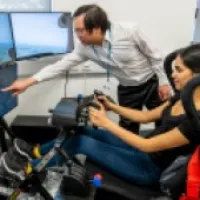
Aerospace Electronic Engineering
Aerospace Electronic Engineering
Biomedical Engineering
Biomedical Engineering
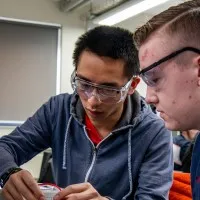
Electrical and Electronic Engineering
Electrical Engineering
Electrical Engineering
Electronic Engineering
Electronic Engineering
Electronic Engineering with Artificial Intelligence

Electronic Engineering with Computer Systems
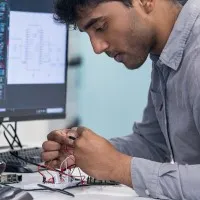
Electronic Engineering with Mobile and Secure Systems
-
Study
- View all courses
- Taught postgraduate study
- Pre-sessional English courses
-
Subjects
- Acoustical engineering
- Aeronautical and astronautical engineering
- Ageing and gerontology
- Archaeology
- Art, design and fashion
- Audiology
- Biological sciences
- Biomedical and medical engineering
- Business, accounting, finance and marketing
- Chemistry
- Civil engineering
- Computer science and software engineering
- Economics
- Education
- Electrical and electronic engineering
- English
- Film studies
- French
- Geography and environmental science
- History
- Languages and linguistics
- Law
- Maritime engineering
- Mathematical sciences
- Mechanical engineering
- Medicine
- Music
- Nursing, midwifery and healthcare
- Ocean and Earth science
- Philosophy
- Photonics and optoelectronics
- Physics and astronomy
- Politics and international relations
- Psychology
- Social statistics and demography
- Sociology, social policy and criminology
-
PhDs and research degrees
- Create your own research project
-
Find a PhD project
- A missing link between continental shelves and the deep sea: Have we underestimated the importance of land-detached canyons?
- A study of rolling contact fatigue in electric vehicles (EVs)
- Acoustic monitoring of forest exploitation to establish community perspectives of sustainable hunting
- Acoustic sensing and characterisation of soil organic matter
- Advancing intersectional geographies of diaspora-led development in times of multiple crises
- Aero engine fan wake turbulence – Simulation and wind tunnel experiments
- Against Climate Change (DACC): improving the estimates of forest fire smoke emissions
- All-in-one Mars in-situ resource utilisation (ISRU) system and life-supporting using non-thermal plasma
- An electromagnetic study of the continent-ocean transition southwest of the UK
- An investigation of the relationship between health, home and law in the context of poor and precarious housing, and complex and advanced illness
- Antibiotic resistance genes in chalk streams
- Being autistic in care: Understanding differences in care experiences including breakdowns in placements for autistic and non-autistic children
- Biogeochemical cycling in the critical coastal zone: Developing novel methods to make reliable measurements of geochemical fluxes in permeable sediments
- Bloom and bust: seasonal cycles of phytoplankton and carbon flux
- British Black Lives Matter: The emergence of a modern civil rights movement
- Building physics for low carbon comfort using artificial intelligence
- Business studies and management: accounting
- Business studies and management: banking and finance
- Business studies and management: decision analytics and risk
- Business studies and management: digital and data driven marketing
- Business studies and management: human resources (HR) management and organisational behaviour
- Business studies and management: strategy, innovation and entrepreneurship
- Carbon storage in reactive rock systems: determining the coupling of geo-chemo-mechanical processes in reactive transport
- Cascading hazards from the largest volcanic eruption in over a century: What happened when Hunga Tonga-Hunga Ha’apai erupted in January 2022?
- Characterisation of cast austenitic stainless steels using ultrasonic backscatter and artificial intelligence
- Climate Change effects on the developmental physiology of the small-spotted catshark
- Climate at the time of the Human settlement of the Eastern Pacific
- Collaborative privacy in data marketplaces
- Compatibility of climate and biodiversity targets under future land use change
- Cost of living in modern and fossil animals
- Creative clusters in rural, coastal and post-industrial towns
- Deep oceanic convection: the outsized role of small-scale processes
- Defect categories and their realisation in supersymmetric gauge theory
- Defining the Marine Fisheries-Energy-Environment Nexus: Learning from shocks to enhance natural resource resilience
- Design and fabrication of next generation optical fibres
- Developing a practical application of unmanned aerial vehicle technologies for conservation research and monitoring of endangered wildlife
- Development and evolution of animal biomineral skeletons
- Development of all-in-one in-situ resource utilisation system for crewed Mars exploration missions
- Ecological role of offshore artificial structures
- Effect of embankment and subgrade weathering on railway track performance
- Efficient ‘whole-life’ anchoring systems for offshore floating renewables
- Electrochemical sensing of the sea surface microlayer
- Engagement with nature among children from minority ethnic backgrounds
- Enhancing UAV manoeuvres and control using distributed sensor arrays
- Ensuring the Safety and Security of Autonomous Cyber-Physical Systems
- Environmental and genetic determinants of Brassica crop damage by the agricultural pest Diamondback moth
- Estimating marine mammal abundance and distribution from passive acoustic and biotelemetry data
- Evolution of symbiosis in a warmer world
- Examining evolutionary loss of calcification in coccolithophores
- Explainable AI (XAI) for health
- Explaining process, pattern and dynamics of marine predator hotspots in the Southern Ocean
- Exploring dynamics of natural capital in coastal barrier systems
- Exploring the mechanisms of microplastics incorporation and their influence on the functioning of coral holobionts
- Exploring the potential electrical activity of gut for healthcare and wellbeing
- Exploring the trans-local nature of cultural scene
- Facilitating forest restoration sustainability of tropical swidden agriculture
- Faulting, fluids and geohazards within subduction zone forearcs
- Faulting, magmatism and fluid flow during volcanic rifting in East Africa
- Fingerprinting environmental releases from nuclear facilities
- Flexible hybrid thermoelectric materials for wearable energy harvesting
- Floating hydrokinetic power converter
- Glacial sedimentology associated subglacial hydrology
- Green and sustainable Internet of Things
- How do antimicrobial peptides alter T cell cytokine production?
- How do calcifying marine organisms grow? Determining the role of non-classical precipitation processes in biogenic marine calcite formation
- How do neutrophils alter T cell metabolism?
- How well can we predict future changes in biodiversity using machine learning?
- Hydrant dynamics for acoustic leak detection in water pipes
- If ‘Black Lives Matter’, do ‘Asian Lives Matter’ too? Impact trajectories of organisation activism on wellbeing of ethnic minority communities
- Illuminating luciferin bioluminescence in dinoflagellates
- Imaging quantum materials with an XFEL
- Impact of neuromodulating drugs on gut microbiome homeostasis
- Impact of pharmaceuticals in the marine environment in a changing world
- Improving subsea navigation using environment observations for long term autonomy
- Information theoretic methods for sensor management
- Installation effect on the noise of small high speed fans
- Integrated earth observation mapping change land sea
- Interconnections of past greenhouse climates
- Investigating IgG cell depletion mechanisms
- Is ocean mixing upside down? How mixing processes drive upwelling in a deep-ocean basin
- Landing gear aerodynamics and aeroacoustics
- Lightweight gas storage: real-world strategies for the hydrogen economy
- Machine learning for multi-robot perception
- Machine learning for multi-robot perception
- Marine ecosystem responses to past climate change and its oceanographic impacts
- Mechanical effects in the surf zone - in situ electrochemical sensing
- Microfluidic cell isolation systems for sepsis
- Migrant entrepreneurship, gender and generation: context and family dynamics in small town Britain
- Miniaturisation in fishes: evolutionary and ecological perspectives
- Modelling high-power fibre laser and amplifier stability
- Modelling soil dewatering and recharge for cost-effective and climate resilient infrastructure
- Modelling the evolution of adaptive responses to climate change across spatial landscapes
- Nanomaterials sensors for biomedicine and/or the environment
- New high-resolution observations of ocean surface current and winds from innovative airborne and satellite measurements
- New perspectives on ocean photosynthesis
- Novel methods of detecting carbon cycling pathways in lakes and their impact on ecosystem change
- Novel technologies for cyber-physical security
- Novel transparent conducting films with unusual optoelectronic properties
- Novel wavelength fibre lasers for industrial applications
- Ocean circulation and the Southern Ocean carbon sink
- Ocean influence on recent climate extremes
- Ocean methane sensing using novel surface plasmon resonance technology
- Ocean physics and ecology: can robots disentangle the mix?
- Ocean-based Carbon Dioxide Removal: Assessing the utility of coastal enhanced weathering
- Offshore renewable energy (ORE) foundations on rock seabeds: advancing design through analogue testing and modelling
- Optical fibre sensing for acoustic leak detection in buried pipelines
- Optimal energy transfer in nonlinear systems
- Optimal energy transfer in nonlinear systems
- Optimizing machine learning for embedded systems
- Oxidation of fossil organic matter as a source of atmospheric CO2
- Partnership dissolution and re-formation in later life among individuals from minority ethnic communities in the UK
- Personalized multimodal human-robot interactions
- Preventing disease by enhancing the cleaning power of domestic water taps using sound
- Quantifying riparian vegetation dynamics and flow interactions for Nature Based Solutions using novel environmental sensing techniques
- Quantifying the response and sensitivity of tropical forest carbon sinks to various drivers
- Quantifying variability in phytoplankton electron requirements for carbon fixation
- Resilient and sustainable steel-framed building structures
- Resolving Antarctic meltwater events in Southern Ocean marine sediments and exploring their significance using climate models
- Robust acoustic leak detection in water pipes using contact sound guides
- Silicon synapses for artificial intelligence hardware
- Smart photon delivery via reconfigurable optical fibres
- The Gulf Stream control of the North Atlantic carbon sink
- The Mayflower Studentship: a prestigious fully funded PhD studentship in bioscience
- The calming effect of group living in social fishes
- The duration of ridge flank hydrothermal exchange and its role in global biogeochemical cycles
- The evolution of symmetry in echinoderms
- The impact of early life stress on neuronal enhancer function
- The oceanic fingerprints on changing monsoons over South and Southeast Asia
- The role of iron in nitrogen fixation and photosynthesis in changing polar oceans
- The role of singlet oxygen signaling in plant responses to heat and drought stress
- Time variability on turbulent mixing of heat around melting ice in the West Antarctic
- Triggers and Feedbacks of Climate Tipping Points
- Uncovering the drivers of non-alcoholic fatty liver disease progression using patient derived organoids
- Understanding recent land-use change in Snowdonia to plan a sustainable future for uplands: integrating palaeoecology and conservation practice
- Understanding the role of cell motility in resource acquisition by marine phytoplankton
- Understanding the structure and engagement of personal networks that support older people with complex care needs in marginalised communities and their ability to adapt to increasingly ‘digitalised’ health and social care
- Unpicking the Anthropocene in the Hawaiian Archipelago
- Unraveling oceanic multi-element cycles using single cell ionomics
- Unravelling southwest Indian Ocean biological productivity and physics: a machine learning approach
- Using acoustics to monitor how small cracks develop into bursts in pipelines
- Using machine learning to improve predictions of ocean carbon storage by marine life
- Vulnerability of low-lying coastal transportation networks to natural hazards
- X-ray imaging and property characterisation of porous materials
- Funding your research degree
- How to apply for a PhD or research degree
- How to make a PhD enquiry
- Support while studying your PhD or research degree
- Exchanges and studying abroad
- Undergraduate study
-
Tuition fees, funding and scholarships
- Fee status
- Scholarships
- Undergraduate funding options
-
Postgraduate funding options
-
Postgraduate scholarships
- Black Futures Postgraduate Research Scholarships (Environmental and Life Sciences)
- Black Futures scholarship
- China Excellence Scholarship
- GREAT Scholarships 2025 – Egypt
- GREAT Scholarships 2025 – France
- GREAT Scholarships 2025 – Ghana
- Horizon Europe fee waiver
- India Excellence Scholarship
- Nigeria Excellence Scholarship
- Nursing Global Impact Scholarship
- Postgraduate Taught Diversity Scholarship (Environmental and Life Sciences)
- Social Impact Scholarships
- Southampton Business School (MSc) Dean Scholarship (UK)
- Southampton Faculty of Medicine PGT Talent Scholarship
- Southampton History Patricia Mather and Helen Patterson Scholarship
- Southampton MA Holocaust scholarships
- Southampton Philosophy David Humphris-Norman Scholarship
- Southampton Philosophy MA Scholarship
- Southampton Photonics Impact Scholarship
- Southampton UK Alumni Music Scholarship
- Study in Art and Media Technology Scholarship
- Thailand Excellence Scholarship
- The National Institute for Health and care Research South Central INSIGHT Programme
- The South Coast Doctoral Training Partnership Social Science PhD Studentships
- Vietnam Excellence Scholarship
- Spärck AI Scholarship
-
Postgraduate scholarships
-
International funding options
-
Scholarships for international students
- Engineering Global Talent Scholarship
- Higher Education Scholarships for Palestinians - HESPAL
- Medical Technology, Innovation and Design Master’s Scholarship
- Merit scholarships for international undergraduates
- Presidential bursaries
- Winchester School of Art Postgraduate Global Talent Scholarship
- Becas Chile Scholarship
- Chevening Scholarships
- China Scholarship Council Scholarships
- COLFUTURO Scholarships
- Commonwealth Distance Learning Scholarships
- Commonwealth Master's Scholarships
- Commonwealth PhD Scholarships
- Commonwealth PhD Scholarships for high income countries
- Commonwealth Shared Scholarships
- Excellence Scholarship
- FIDERH Scholarships
- Southampton Education Civic Scholarship
- Fulbright Awards
- Southampton Ageing and Gerontology Talent Scholarship
- Southampton Teachers' Postgraduate Scholarship
- FUNED Scholarships
- Great Scholarships 2024 – Mexico
- Great Scholarships 2024 – Nigeria
- Marshall Scholarship
- Saïd Foundation Scholarships
- Southampton Canadian Prestige Scholarship for Law
- Xiamen University PhD Scholarships
- GREAT scholarships 2026 – Indonesia
-
Scholarships for international students
- External funding opportunities
- Short courses
- Lunchtime evening and weekend courses
- Clearing
- Summer schools
- Get a prospectus
- Student life
-
Research
- Our impact
- Research projects
- Research areas
- Research facilities
- Collaborate with us
-
Institutes, centres and groups
- Active Living
- Advanced Fibre Applications
- Advanced Laser Laboratory
- Advanced Project Management Research Centre
- Antibody and Vaccine Group
- Astronomy Group
- Autism Community Research Network @ Southampton (ACoRNS)
- Bioarchaeology and Osteoarchaeology at Southampton (BOS)
- Bladder and Bowel Management
- Cell and Developmental Biology
- Centre for Defence and Security Research
- Centre for Developmental Origins of Health and Disease
- Centre for Digital Finance
- Centre for Eastern European and Eurasian Studies (CEEES)
- Centre for Empirical Research in Finance and Banking (CERFIB)
- Centre for Geometry, Topology, and Applications
- Centre for Global Health and Policy (GHaP)
- Centre for Green Maritime Innovation (cGMI)
- Centre for Health Technologies
- Centre for Healthcare Analytics
- Centre for Human Development, Stem Cells and Regeneration
- Centre for Imperial and Postcolonial Studies
- Centre for Inclusive and Sustainable Entrepreneurship and Innovation (CISEI)
- Centre for International Film Research (CIFR)
- Centre for International Law and Globalisation
- Centre for Internet of Things and Pervasive Systems
- Centre for Justice Studies
- Centre for Linguistics, Language Education and Acquisition Research
- Centre for Machine Intelligence
- Centre for Maritime Archaeology
- Centre for Medieval and Renaissance Culture (CMRC)
- Centre for Political Ethnography (CPE)
- Centre for Research in Accounting, Accountability and Governance
- Centre for Research on Work and Organisations
- Centre for Resilient Socio-Technical Systems
- Centre for Transnational Studies
- Child and Adolescent Research Group
- Clinical Ethics, Law and Society (CELS)
- Clinical Legal Education
- Computational Nonlinear Optics
- Cyber Security Academy
- Data Science Group
- Digital Oceans
- EPSRC and MOD Centre for Doctoral Training in Complex Integrated Systems for Defence and Security
- Economic Theory and Experimental Economics
- Economy, Society and Governance
- Electrical Power Engineering
- Environmental Hydraulics
- Gas Photonics in Hollow Core Fibres
- Geochemistry
- Global Health (Demography)
- Global Health Community of Practice
- Gravity group
- High Power Fibre Lasers
- Hollow Core Fibre
- Human Genetics and Genomic Medicine
- Infection
- Infrastructure Group
- Institute of Developmental Sciences
- Institute of Maritime Law (IML)
- Integrated Photonic Devices
- Interdisciplinary Musculoskeletal Health
- International Centre for Ecohydraulics Research (ICER)
- Language Assessment and Testing Unit (LATU)
- Laser-Direct-Write (LDW) Technologies for Biomedical Applications
- Law and Technology Centre
- Long Term Conditions
- Magnetic Resonance
- Mathematical Modelling
- Medicines Management
- Molecular and Precision Biosciences
- Multiwavelength Accretion and Astronomical Transients
- National Biofilms Innovation Centre (NBIC)
- National Centre for Research Methods
- National Infrastructure Laboratory
- Nature-Based Ocean Solutions
- Nonlinear Semiconductor Photonics
- Ocean Perception Group
- Operational Research
- Optical Engineering and Quantum Photonics Group
- Paediatrics and Child Health - Clinical and Experimental Sciences
- People, Property, Community
- Photonic Systems, Circuits and Sensors Group
- Physical Optics
- Primary Care Research Centre
- Quantum, Light and Matter Group
- Silica Fibre Fabrication
- Silicon Photonics
- Skin Sensing Research Group
- Southampton Ethics Centre
- Southampton Health Technology Assessments Centre (SHTAC)
- Southampton High Energy Physics group
- Southampton Imaging
- Southampton Theory Astrophysics and Gravity (STAG) Research Centre
- Stefan Cross Centre for Women, Equality and Law
- String theory and holography
- The India Centre for Inclusive Growth and Sustainable Development
- The Parkes Institute
- Tony Davies High Voltage Laboratory
- Ultrafast X-ray Group
- Vision Science
- WSA Exchange
- Work Futures Research Centre (WFRC)
- Support for researchers
- Faculties, schools and departments
- Interdisciplinary research
- Find people and expertise
- Research jobs
- Business
- Global
- About
- Visit
- Alumni
- Departments
- News
- Events
- Contact
